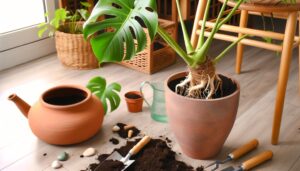Best Soil for Monstera Deliciosa: Comprehensive Guide!
For best growth, Monstera Deliciosa requires a well-draining soil mix. A balanced composition includes peat moss, perlite, and pine bark.
Peat moss aids in moisture retention and nutrient uptake, while perlite enhances aeration and drainage. Pine bark provides structural integrity and essential micronutrients.
The ideal soil pH ranges from 5.5 to 7.0. Proper soil aeration prevents root rot and waterlogging, promoting healthy root development.
Including organic matter such as compost or worm castings improves nutrient availability and soil health. For success, consistent moisture without waterlogging is essential.
Explore further to ensure your Monstera thrives in its best soil environment.
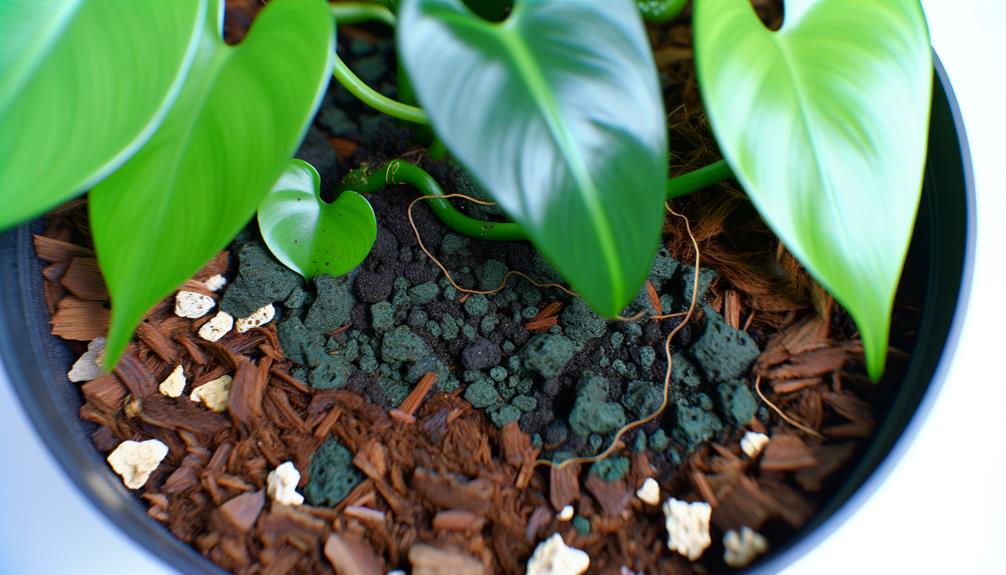
Key Takeaways
- Use a well-draining mix of peat moss, perlite, and pine bark to promote healthy Monstera Deliciosa growth.
- Ensure soil pH is between 5.5 and 7.0 for optimal Monstera nutrient absorption.
- Incorporate perlite for better soil aeration and drainage, preventing root rot.
- Add organic matter like compost and worm castings to enrich soil nutrient content and structure.
- Avoid waterlogged conditions by maintaining a balance of moisture retention and aeration with components like coco coir and vermiculite.
Soil Composition
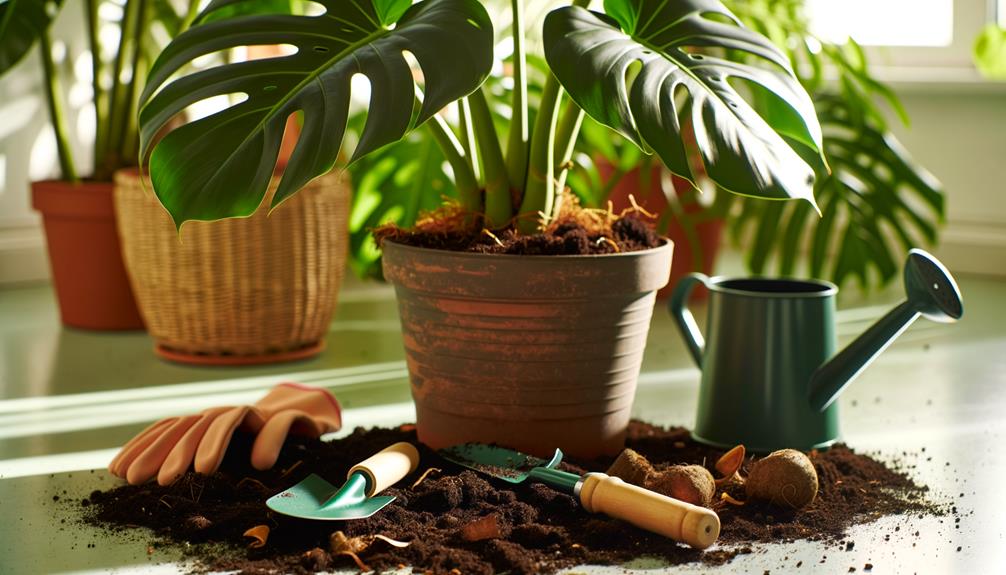
The perfect soil composition for Monstera Deliciosa includes a well-draining mixture of peat moss, perlite, and pine bark to balance moisture retention and aeration.
Peat moss provides vital organic material, assisting in moisture retention and nutrient availability.
Perlite, a volcanic glass, improves soil aeration and drainage, avoiding root compaction and promoting healthy root growth.
Pine bark contributes to the soil structure by enhancing porosity and adding essential micronutrients.
This combination ensures the soil remains slightly acidic, with a pH range of 5.5 to 7.0, ideal for Monstera Deliciosa.
The precise balance of these components creates an environment conducive to vigorous growth, preventing issues related to excessively wet or compacted soil, which could impede plant health.
Importance of Drainage
Proper drainage is crucial for Monstera Deliciosa as it prevents waterlogged conditions that can lead to root rot and other harmful issues. The plant’s root system requires a balance of moisture and air to remain healthy.
Utilizing a well-draining soil mix, typically composed of components like perlite, orchid bark, and peat moss, helps excess water exit promptly, thereby avoiding an anaerobic environment harmful to root health.
Inadequate drainage can result in the proliferation of pathogens, such as Pythium and Phytophthora, which thrive in saturated conditions. Additionally, ensuring proper drainage enhances nutrient uptake, as overly wet soil can hinder the plant’s ability to absorb essential minerals, consequently impacting overall growth and health.
Moisture Retention
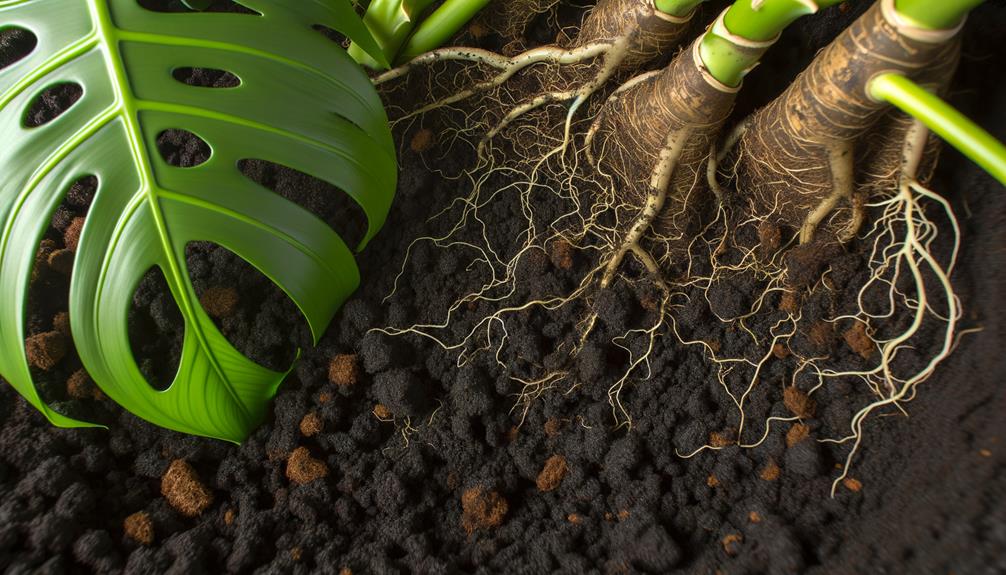
Effective moisture retention is crucial for Monstera Deliciosa to maintain consistent hydration levels without becoming overly saturated. The soil must balance water retention with the ability to dry out sufficiently between waterings. Key components aiding moisture retention include peat moss, coco coir, and vermiculite.
| Component | Description | Benefits |
|---|---|---|
| Peat Moss | Organic material with high porosity | Retains moisture, improves texture |
| Coco Coir | Fibrous coconut husk byproduct | Holds water effectively, biodegradable |
| Vermiculite | Silicate mineral with high absorbency | Enhances moisture retention, lightweight |
These elements work together harmoniously to create an ideal environment, ensuring the plant’s roots have access to necessary moisture while preventing waterlogging. Proper moisture management is crucial for the health and growth of Monstera Deliciosa.
Aeration Needs
Balancing moisture retention with adequate aeration is necessary to prevent root rot and promote healthy growth for Monstera Deliciosa.
An ideal soil mix should contain components such as perlite, orchid bark, and coarse sand, which enhance air circulation around the roots. These materials create macropores within the substrate, facilitating oxygen exchange and reducing compaction.
Additionally, incorporating sphagnum peat moss can improve moisture retention without compromising aeration. It is important to avoid heavy, dense soils that can suffocate roots, leading to anaerobic conditions detrimental to plant health.
Regularly evaluating soil structure and ensuring proper drainage will mitigate the risk of overwatering. Consequently, a well-aerated soil environment is essential for the robust development of Monstera Deliciosa.
Nutrient Requirements
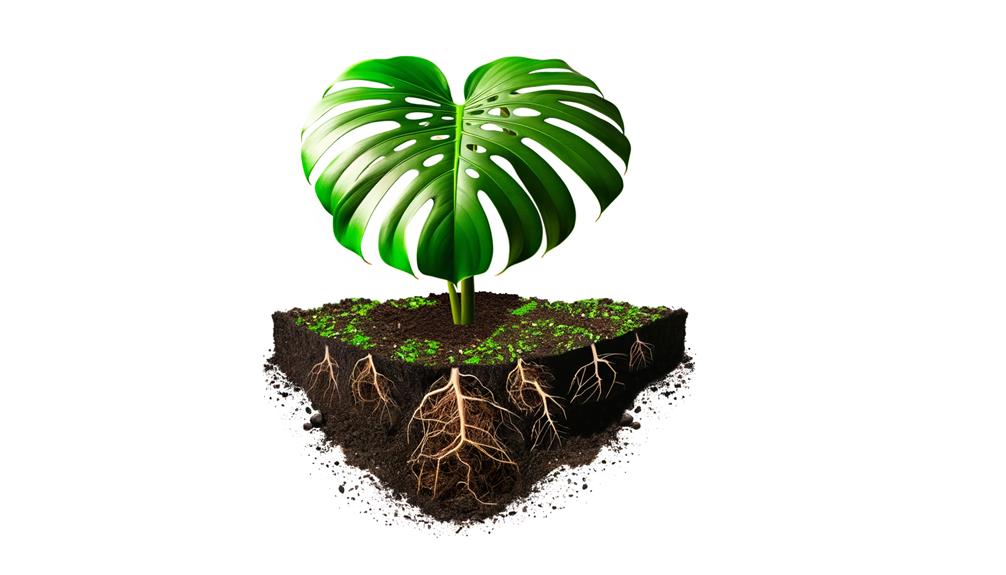
Monstera Deliciosa requires a balanced supply of essential nutrients for robust growth and vibrant foliage. This includes nitrogen, phosphorus, and potassium. Understanding the specific breakdown of these nutrients is crucial for optimizing plant health.
Implementing appropriate soil amendments can greatly enhance the nutrient profile, fostering an ideal growing environment.
Essential Nutrients Breakdown
Understanding the essential nutrients needed by Monstera Deliciosa is key for promoting optimal growth and vibrant foliage. This plant thrives when necessary macronutrients and micronutrients are available in crucial quantities.
Macronutrients such as nitrogen (N), phosphorus (P), and potassium (K) are important for growth, root development, and overall health. Micronutrients like iron (Fe), magnesium (Mg), and calcium (Ca) support various physiological functions and structural integrity.
| Nutrient | Function | Deficiency Symptoms |
|---|---|---|
| Nitrogen (N) | Leaf growth and color | Yellowing leaves |
| Phosphorus (P) | Root development | Stunted growth |
| Potassium (K) | Overall health and disease resistance | Leaf edge browning |
| Iron (Fe) | Chlorophyll production | Interveinal chlorosis |
| Magnesium (Mg) | Photosynthesis | Leaf curling |
Sufficient nutrient supply guarantees Monstera Deliciosa maintains strong growth and striking foliage.
Soil Amendments Guide
To ensure Monstera Deliciosa receives the necessary nutrients for robust growth, incorporating specific soil amendments is essential. These amendments enhance the soil’s nutrient profile, ensuring prime plant health and vitality.
Consider the following essential amendments:
- Composted Organic Matter: Rich in nutrients, compost improves soil structure and fosters beneficial microbial activity.
- Perlite: Enhances aeration and drainage, preventing root rot and promoting healthy root development.
- Worm Castings: Packed with essential nutrients and beneficial microbes, worm castings greatly boost soil fertility.
- Bone Meal: A slow-release source of phosphorus, bone meal aids in root development and flower formation.
Implementing these amendments will create an ideal growing environment for Monstera Deliciosa, ensuring it thrives and displays its characteristic lush foliage.
Organic Matter
Incorporating organic material into the soil mix for Monstera deliciosa can significantly enhance nutrient availability and improve soil structure. Organic material, such as compost, decomposed leaf litter, and well-rotted manure, supplies essential macronutrients like nitrogen, phosphorus, and potassium.
Additionally, it contributes beneficial microorganisms that aid in nutrient cycling and disease suppression. The presence of organic material improves soil aeration and water retention, key factors for Monstera’s root health. It also promotes a well-draining environment, essential for preventing root rot.
To achieve ideal results, aim for a balanced incorporation of organic material, ensuring it constitutes approximately 20-30% of the total soil mix. This careful integration fosters a robust, thriving Monstera deliciosa.
Ph Levels
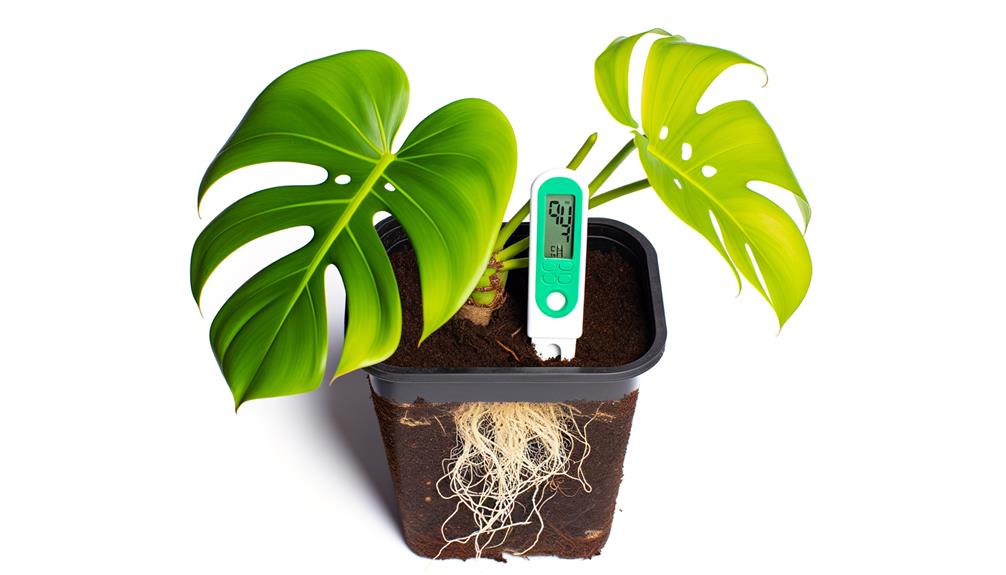
The pH level of the soil plays a crucial role in Monstera deliciosa’s nutrient uptake and overall health. Ideal soil pH for Monstera deliciosa ranges between 5.5 and 7.0.
Maintaining this range guarantees the availability of essential nutrients such as nitrogen, phosphorus, and potassium. Deviations from this pH range can result in nutrient deficiencies or toxicities, affecting plant vitality.
Consider these key points to understand the importance of pH levels:
- Nutrient Availability: Proper pH balance facilitates the absorption of essential nutrients.
- Microbial Activity: Optimal pH supports beneficial microbial life, enhancing soil health.
- Root Function: pH influences root growth and function, crucial for water and nutrient uptake.
- Plant Stress: Incorrect pH levels can stress the plant, leading to poor growth and disease susceptibility.
Soil Amendments
In optimizing soil for Monstera Deliciosa, incorporating soil amendments such as organic matter and perlite is essential.
Organic matter enhances nutrient availability and water retention, fostering robust growth.
Perlite improves soil aeration and drainage, preventing root rot and promoting healthy root systems.
Organic Matter Benefits
Organic matter greatly enhances soil structure, nutrient content, and water retention capabilities, which are essential for the best growth of Monstera Deliciosa. Enriching the soil with organic amendments such as compost, peat moss, or well-rotted manure provides numerous advantages that promote robust plant health.
The integration of organic matter offers the following benefits:
- Improved Soil Structure: Organic matter binds soil particles, creating a crumbly texture that facilitates root growth and air circulation.
- Enhanced Nutrient Retention: Organic amendments increase the soil’s ability to hold essential nutrients, ensuring they are readily available to the plant.
- Increased Microbial Activity: A rich organic environment supports beneficial microorganisms that aid in nutrient breakdown and uptake.
- Superior Water Retention: Organic matter improves the soil’s capacity to retain moisture, reducing the frequency of watering.
Perlite for Aeration
Complementing the benefits of organic matter, incorporating perlite into the soil mix enhances aeration and drainage, which are essential for the best growth of Monstera Deliciosa.
Perlite, a volcanic glass that expands when heated, creates air pockets within the soil structure. These air pockets facilitate oxygen flow to the roots while preventing compaction, thereby promoting robust root development.
Additionally, perlite’s porous nature allows excess water to drain efficiently, mitigating the risk of root rot a common issue with poorly draining soils.
The ideal soil mix for Monstera Deliciosa typically includes approximately 20-30% perlite. This proportion ensures optimal balance between moisture retention and aeration, fostering a healthy, thriving environment for this tropical plant species.
Potting Mix Recipes
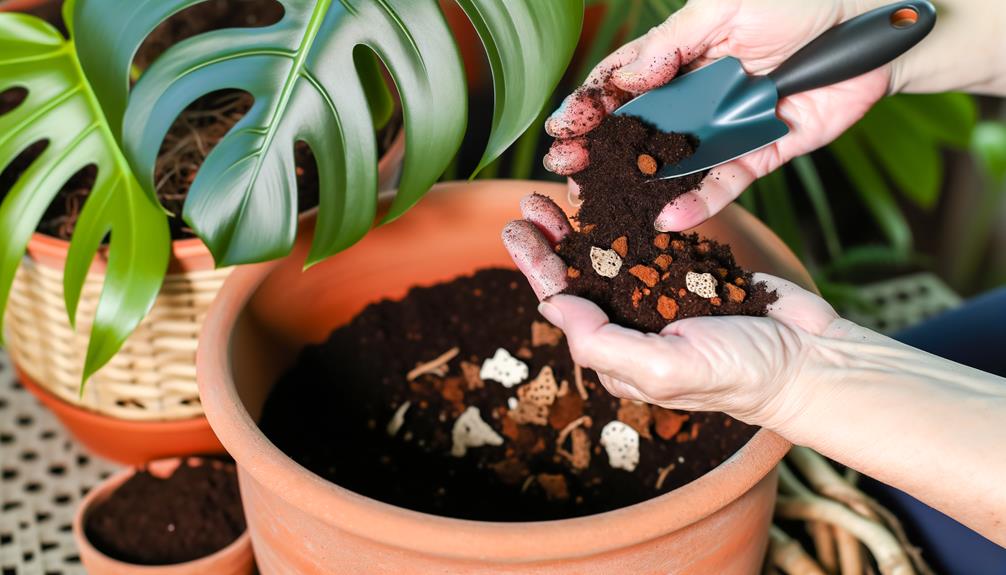
What constitutes the best potting mix for Monstera Deliciosa to guarantee excellent drainage, aeration, and nutrient availability? A well-balanced mix is essential for ideal growth and health of this tropical plant.
Here are four components to create an effective potting mix:
- Coco Coir (40%) – Provides a sustainable base, retaining moisture without waterlogging.
- Perlite (20%) – Enhances aeration and drainage, preventing root rot.
- Bark Chips (20%) – Improves soil structure and mimics the natural environment.
- Compost (20%) – Supplies necessary nutrients, fostering robust growth.
Each ingredient contributes to a balanced medium, ensuring the Monstera Deliciosa thrives with adequate moisture, airflow, and nutrient availability. This mix supports healthy root development and vibrant foliage.
Common Mistakes
A fundamental understanding of common mistakes is crucial for best Monstera Deliciosa care.
Overwatering issues, poor drainage, and incorrect soil composition often lead to root rot and stunted growth.
Addressing these errors can greatly improve plant health and strength.
Overwatering Issues
Overwatering is a prevalent issue that can lead to root rot, nutrient deficiencies, and ultimately, the decline of Monstera Deliciosa. This common mistake can be detrimental to the plant’s health, impairing its ability to absorb oxygen and essential nutrients.
To prevent overwatering, consider these critical points:
- Check Soil Moisture Regularly: Use a moisture meter to gauge soil moisture levels accurately.
- Adjust Watering Schedule: Adapt the frequency of watering based on the plant’s environment and seasonal changes.
- Monitor Plant Indicators: Look for symptoms like yellowing leaves and a musty odor, which typically signal overwatering.
- Implement Proper Watering Techniques: Water the plant thoroughly but allow the soil to dry out partially between waterings.
Poor Drainage Problems
Inadequate drainage is a critical issue that can severely impair the health of Monstera Deliciosa by causing water to accumulate around the roots. This accumulation creates an anaerobic environment, leading to root rot, a condition where roots decay due to oxygen deprivation.
Root rot manifests as yellowing leaves, stunted growth, and an overall decline in plant vigor. To avoid poor drainage, it is essential to use pots with drainage holes and incorporate materials such as perlite, orchid bark, or coarse sand into the soil mix to enhance aeration.
Regularly checking the drainage efficiency of the potting mix is also advisable. Ensuring proper drainage is paramount to maintaining the best health and growth of Monstera Deliciosa.
Wrong Soil Composition
Beyond drainage issues, another important factor affecting the health of Monstera Deliciosa is the incorrect composition of the soil. Utilizing improper soil mixtures can result in nutrient deficiencies, root rot, and overall plant decline.
Common mistakes include:
- Excessive Peat Moss: While it retains moisture, too much can lead to waterlogged conditions, suffocating roots.
- High Clay Content: Clay-heavy soils hinder drainage and aeration, essential for healthy root systems.
- Overly Sandy Soil: Although it improves drainage, sandy soil can drain too quickly, depriving the plant of necessary moisture.
- Lack of Organic Matter: Insufficient organic content can lead to poor nutrient availability, impacting plant growth and health.
Understanding these pitfalls can greatly enhance the well-being of your Monstera Deliciosa.
Maintenance Tips
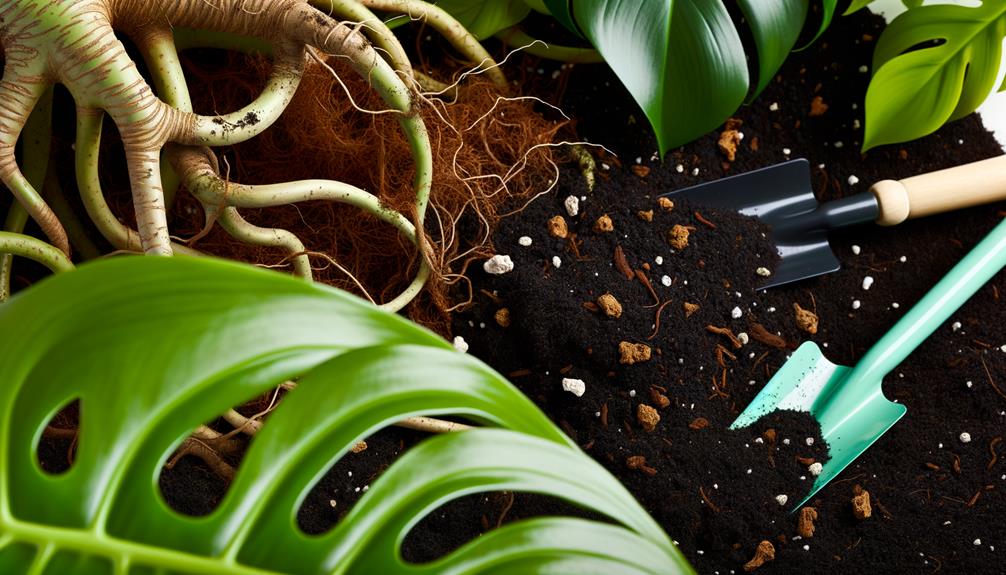
Proper maintenance of Monstera Deliciosa involves regular monitoring of soil moisture levels, ensuring adequate light exposure, and periodic fertilization.
Soil moisture should be maintained at a consistent level, avoiding both waterlogged conditions and complete dryness. The best watering frequency depends on environmental factors but generally falls between every 1-2 weeks.
Light exposure should be bright, indirect sunlight to prevent leaf burn while promoting photosynthesis. Fertilization should be conducted every 4-6 weeks during the growing season with a balanced, water-soluble fertilizer, ensuring essential nutrients are available for robust growth.
Additionally, inspecting the plant regularly for pests and disease can mitigate potential issues early, maintaining the plant’s overall health and vigor.
Conclusion
In the grand tapestry of plant care, selecting the best soil for Monstera deliciosa mirrors the precision of a maestro conducting a symphony. The soil must harmonize drainage, moisture retention, aeration, and nutrient balance to cultivate a thriving specimen.
Just as a composer fine-tunes each note, so must each soil component be meticulously chosen and balanced. By adhering to these principles, the Monstera deliciosa will flourish, embodying the serene beauty of a perfectly orchestrated masterpiece.



